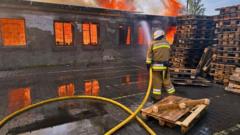In a notable event marking 80 years since the victory over Nazi Germany, President Vladimir Putin presided over an extravagant military parade in Moscow, seeking to assert Russia's global status despite its struggles in the ongoing conflict in Ukraine.
Putin's Victory Day Parade: A Display of Power Amidst Military Struggles

Putin's Victory Day Parade: A Display of Power Amidst Military Struggles
Russia celebrates military prowess with a parade, but the contradiction of ongoing war challenges its significance.
As the celebration unfolded, Putin stood alongside China's President Xi Jinping, signaling an alignment with non-Western leaders amidst Western sanctions. The parade, attended by over 20 international dignitaries including Brazil’s President Lula da Silva and leaders from Slovakia and Serbia, was intended to showcase Russia's influence on the global stage.
Yet, the spectacle was marred by the stark reality of military setbacks. The Russian military has failed to secure a significant victory in Ukraine, achieving only minor advancements over the past several months, while economic woes linger due to fluctuating oil prices and persistent inflation.
Historically a unifying event for the country, this year’s Victory Day has accentuated divisions, reflecting how Putin has increasingly co-opted the event to justify the Ukraine invasion, a narrative that resonates less amidst the backdrop of prolonged conflict.
The juxtaposition of an elaborate military display against a faltering war effort raises questions about the actual strength of Russia's standing and its future trajectory on the world stage as conflict with Ukraine continues.
Yet, the spectacle was marred by the stark reality of military setbacks. The Russian military has failed to secure a significant victory in Ukraine, achieving only minor advancements over the past several months, while economic woes linger due to fluctuating oil prices and persistent inflation.
Historically a unifying event for the country, this year’s Victory Day has accentuated divisions, reflecting how Putin has increasingly co-opted the event to justify the Ukraine invasion, a narrative that resonates less amidst the backdrop of prolonged conflict.
The juxtaposition of an elaborate military display against a faltering war effort raises questions about the actual strength of Russia's standing and its future trajectory on the world stage as conflict with Ukraine continues.






















